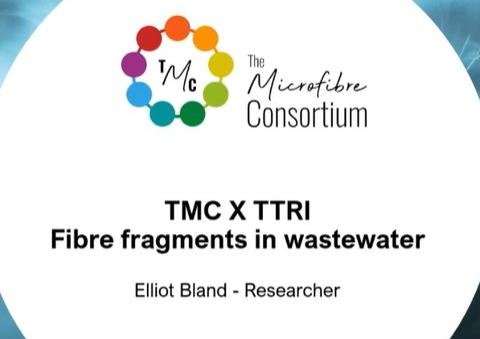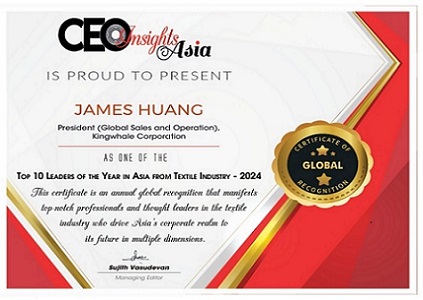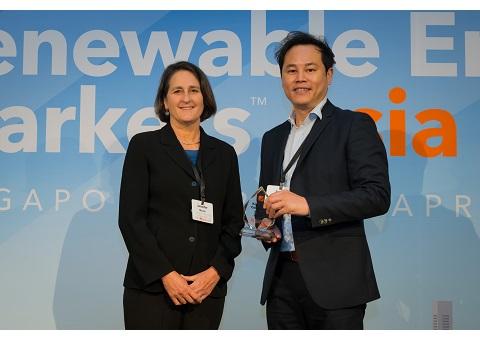News
Latest news
18.Aug.22
Changing clothes: how the textile industry is embracing a cleaner future
Ruters: Changing clothes: how the textile industry is embracing a cleaner future
Economist: How The Textile Industry Is Embracing A Cleaner Future
The textile industry is being led away from a polluting, emissions-heavy past towards a more sustainable tomorrow.
The fashion industry has a reputation for being a major source of pollution and is notoriously wasteful: it is estimated that globally, textiles consume around 108 million tons of unrenewable resources each year with only about 1 percent of the textiles being recycled into new clothing.
Shawn Chuang, Senior Account Manager at Kingwhale says that “business as usual” has to change to make the industry fit for the future - though this in itself presents challenges:
“Although the circular economy holds a great promise for the environment that we live in. It must also satisfy the needs of businesses in order to be called a successful business model. The Kingwhale goal is to find the perfect balance between business benefits and the environmental benefits.”
Kingwhale, established in 1992, specializes in high performance textiles for active sportswear, casual wear, outdoor clothing, and other functional wear. The company offers clients a vertically integrated solution from raw materials to garment production, and has built a strong reputation for reliability. Now the company hopes to add sustainability to the mix. Beyond the evolution of Performance and Sustainability, Beyarn™ is founded in functional fiber technology, providing ultimate comfort with our eco-friendly fabric collections such as BeBreeze, BeFlex, BeWarm and BeShell.
And as James Huang, President at Kingwhale says, they are committing to investment:
“Kingwhale has been a leading performance textile manufacturer in the market. We put a lot of effort into developing sustainable materials, investing in material science, trying to create the most sustainable and performance and innovative products in various applications.”
The company, based in Taiwan, is at the heart of the world’s performance textile industry. Shawn Chuang says that as a leading company in the area, they have a role to play in promoting better working methods:
“It is essential for Taiwan to increase resource efficiency by moving towards a circular economy. By doing so, we can extend the lives of the clothing that manufacturers and brands design for reuse and repair. At Kingwhale, we are going to develop a new business model that will keep the products in use, by design, for as long as possible.”
Such initiatives include producing material from recycled poly chip, collected from post-industrial and post-consumer waste. This is rebuilt and regenerated through a series of processes and turned back into products for sale. By adopting this approach, Kingwhale is addressing the major problem of waste that goes into landfill or is incinerated.
Chris Lin, Special Assistant to President & Director at Kingwhale, says that the future is bright for companies that adopt the circular economy and protect the planet across their operations:
“Our efforts don't just result in a better and more sustainable material; we have also proven that the textile industry can lighten the load of landfill, minimize the dependence of petrochemicals and reduce carbon emissions. By continuing to research and develop in these areas we are looking forward to becoming carbon neutral by the year 2050.”
The drive for these new developments comes from internal factors, as the company wishes to play a role in a sustainable future; but the idea is catching on as Lin says that clients are asking for more sustainable products. In turn, Kingwhale is dedicating more time to design and production, such as new ways of dying materials. Lin explains:
“Compared to the conventional dying process, our low impact technology achieves a high standard at a lower temperature. Shortening the dying process saves 22 percent of the energy used for heating and cooling. Further savings include 50 percent of thermal energy used to create steam and 60 percent of the water needed for dye generation. Our factories produce less waste, use fewer resources and have lower energy needs in order to ensure a sustainable future.”
Lin also points to a company-wide energy strategy, with a clear shift towards emissions reduction. The company’s Vietnam factory, for example, already runs on 100 percent renewable energy and the whole organization is well on track to achieving ambitious targets in line with the United Nations Sustainable Development Goals.
For James Huang, the new ways of working present an opportunity to reach more end users directly:
“Kingwhale has always been very keen to adapt and bring new ideas and services to the market. Consumer behavior has changed and we need to adapt to new purchasing habits and customer expectations. As e-commerce has become the major platform for consumers, we have set up our digital marketing strategy, enabling us to communicate the performance and benefits of our products directly to our customers.”
For Huang, he hopes the message is loud and clear: the industry is changing - for the better. We born from the yarn, and always act beyond.
Economist: How The Textile Industry Is Embracing A Cleaner Future
The textile industry is being led away from a polluting, emissions-heavy past towards a more sustainable tomorrow.
The fashion industry has a reputation for being a major source of pollution and is notoriously wasteful: it is estimated that globally, textiles consume around 108 million tons of unrenewable resources each year with only about 1 percent of the textiles being recycled into new clothing.
Shawn Chuang, Senior Account Manager at Kingwhale says that “business as usual” has to change to make the industry fit for the future - though this in itself presents challenges:
“Although the circular economy holds a great promise for the environment that we live in. It must also satisfy the needs of businesses in order to be called a successful business model. The Kingwhale goal is to find the perfect balance between business benefits and the environmental benefits.”
Kingwhale, established in 1992, specializes in high performance textiles for active sportswear, casual wear, outdoor clothing, and other functional wear. The company offers clients a vertically integrated solution from raw materials to garment production, and has built a strong reputation for reliability. Now the company hopes to add sustainability to the mix. Beyond the evolution of Performance and Sustainability, Beyarn™ is founded in functional fiber technology, providing ultimate comfort with our eco-friendly fabric collections such as BeBreeze, BeFlex, BeWarm and BeShell.
And as James Huang, President at Kingwhale says, they are committing to investment:
“Kingwhale has been a leading performance textile manufacturer in the market. We put a lot of effort into developing sustainable materials, investing in material science, trying to create the most sustainable and performance and innovative products in various applications.”
The company, based in Taiwan, is at the heart of the world’s performance textile industry. Shawn Chuang says that as a leading company in the area, they have a role to play in promoting better working methods:
“It is essential for Taiwan to increase resource efficiency by moving towards a circular economy. By doing so, we can extend the lives of the clothing that manufacturers and brands design for reuse and repair. At Kingwhale, we are going to develop a new business model that will keep the products in use, by design, for as long as possible.”
Such initiatives include producing material from recycled poly chip, collected from post-industrial and post-consumer waste. This is rebuilt and regenerated through a series of processes and turned back into products for sale. By adopting this approach, Kingwhale is addressing the major problem of waste that goes into landfill or is incinerated.
Chris Lin, Special Assistant to President & Director at Kingwhale, says that the future is bright for companies that adopt the circular economy and protect the planet across their operations:
“Our efforts don't just result in a better and more sustainable material; we have also proven that the textile industry can lighten the load of landfill, minimize the dependence of petrochemicals and reduce carbon emissions. By continuing to research and develop in these areas we are looking forward to becoming carbon neutral by the year 2050.”
The drive for these new developments comes from internal factors, as the company wishes to play a role in a sustainable future; but the idea is catching on as Lin says that clients are asking for more sustainable products. In turn, Kingwhale is dedicating more time to design and production, such as new ways of dying materials. Lin explains:
“Compared to the conventional dying process, our low impact technology achieves a high standard at a lower temperature. Shortening the dying process saves 22 percent of the energy used for heating and cooling. Further savings include 50 percent of thermal energy used to create steam and 60 percent of the water needed for dye generation. Our factories produce less waste, use fewer resources and have lower energy needs in order to ensure a sustainable future.”
Lin also points to a company-wide energy strategy, with a clear shift towards emissions reduction. The company’s Vietnam factory, for example, already runs on 100 percent renewable energy and the whole organization is well on track to achieving ambitious targets in line with the United Nations Sustainable Development Goals.
For James Huang, the new ways of working present an opportunity to reach more end users directly:
“Kingwhale has always been very keen to adapt and bring new ideas and services to the market. Consumer behavior has changed and we need to adapt to new purchasing habits and customer expectations. As e-commerce has become the major platform for consumers, we have set up our digital marketing strategy, enabling us to communicate the performance and benefits of our products directly to our customers.”
For Huang, he hopes the message is loud and clear: the industry is changing - for the better. We born from the yarn, and always act beyond.
Other
Latest news
27.Nov.24
Top 10 Leaders of the Year in Asia from Textile Industry - 2024
Latest news
27.Apr.23






